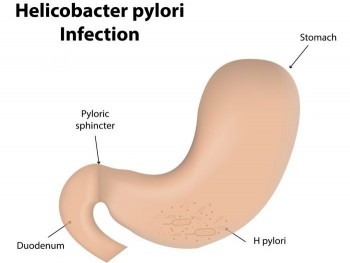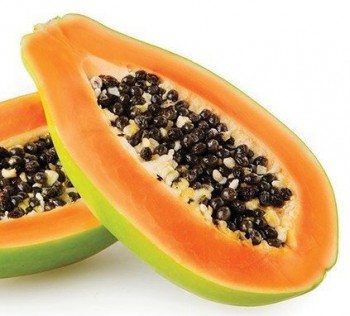Can Vitamin C Lower Stomach and Colorectal Cancer Risk?
Editor’s Note: This article first appeared in the September 2016 edition of TTAC’s Heroes Against Cancer member newsletter.
Vitamins are organic substances that are found mainly in plants and are essential in small amounts for your health, growth, reproduction, and maintenance.You need to consume vitamins regularly, since they either cannot be made at all or are not made in sufficient quantities in your body. For instance, vitamin C is considered to be an “essential” nutrient because you cannot make it at all in your body, so you must get all the vitamin C you need from the foods you consume.

You must get vitamin C from plant sources or supplements as your body cannot produce it
Bioflavonoids are widely present in plants and are important for flower coloration. They produce yellow or red/blue pigmentation in petals that are designed to attract pollinator animals such as bees and birds.
Bioflavonoids are also involved in higher plant functions such as UV filtration, symbiotic nitrogen fixation, and floral pigmentation. In some instances, they may act as chemical messengers, physiological regulators, and cell cycle inhibitors.
Why Is Vitamin C an “Essential Cofactor”?
In your body, vitamin C acts as an essential cofactor in many enzymatic reactions. A cofactor is a compound needed for an enzyme to function optimally – and “essential” means that many enzymes simply cannot do their job without vitamin C.Enzymes are biological proteins that dramatically increase the speed and efficiency of hundreds of chemical reactions in the cells in your body.
For instance, vitamin C is an essential cofactor for the enzymatic reactions by which collagen – a fibrous protein that is the structural basis of skin, tendon, bone, cartilage, and all other connective tissue – and other biologically important substances are made in your body.
Vitamin C is crucial for the growth and repair of your body’s tissues, for making skin, tendons, and blood vessels, helping wounds heal faster, and keeping bones and teeth healthy.
Along with being a cofactor, vitamin C is also a powerful antioxidant. An antioxidant prevents or reduces the damage caused by reactive oxygen species (ROS) or free radicals – both of which react chemically with cellular structures, damaging them and contributing to aging and chronic diseases such as diabetes, heart disease, and cancer.
Vitamin C is the main antioxidant both in blood and in your body’s cells, where it acts to protect proteins, fats, carbohydrates, DNA, and RNA from damage by free radicals and ROS that are generated both by the normal daily workings of your body, as well as a result of exposure to toxins and pollutants like pollution, chemotherapy drugs, and cigarette smoke, among others.
Importantly, vitamin C also helps to re-activate other important antioxidants such as vitamin E from its inactive to active form.
Multiple studies show that higher intakes of vitamin C from either diet or supplements are linked to a lower risk of cardiovascular disease, including both coronary heart disease and stroke.
The Link Between Vitamin C and Stomach Cancer
Gastrointestinal cancers account for 20 percent of all cancers in the U.S. Geographic and ethnic differences in stomach cancer incidence worldwide clearly indicate that there is a close link between this disease and diet.
Consuming processed meats preserved with nitrites and nitrates can increase your risk of stomach cancer
Promisingly, stomach cancer risk is reduced in response to high intake of fruit and vegetables. Laboratory and animal studies suggest that vitamin C is the most likely candidate responsible for this.
Consuming fiber, lycopene, and selenium may also potentially reduce the risk for stomach cancer.
The most obvious and effective way to reduce your risk of developing stomach cancer is to reduce consumption of processed and salted foods, while simultaneously increasing consumption of fresh fruits, vegetables, and vitamin C supplements.
Specifically, vitamin C is believed to block the formation of carcinogenic N-nitroso compounds in the stomach. While higher dietary vitamin C has been linked to a lower risk of stomach cancer in numerous studies, it’s not yet clear how vitamin C intake via diet relates to blood levels when it comes to stomach cancer risk.
To understand this relationship, vitamin C levels were measured in the blood of 215 patients with stomach cancer relative to 416 control subjects without the disease. This was done within the European Prospective Investigation into Cancer and Nutrition (EPIC), a large cohort involving 10 European countries.
[Note – A cohort is a group of subjects who share a common characteristic such as age range or are at high risk for a particular disease, or already have it, such as gastric cancer.]
Interestingly, subjects with the highest blood levels of vitamin C were at significantly lower risk relative to those with the lowest blood levels. This so-called “inverse association” was seen more clearly in subjects who regularly consumed red and processed meats, which is likely to increase production of carcinogenic N-nitroso compounds in the body.
Infection with H. pylori – a type of bacteria that grow in the digestive tract and attack the stomach lining, causing

H. pylori are harmful bacteria that attack the stomach lining
A 1998 study showed that vitamin C levels in the stomach liquids of 19 patients infected with H. pylori were significantly lower than those in 10 subjects who were H. pylori-negative, even though both groups had similar blood levels of vitamin C.
Evidence further suggests that vitamin C supplementation along with standard therapy used to eradicate H. pylori increases the efficacy of the therapy. In other words, vitamin C may prove to be effective as a preventive therapy for H. pylori infections, indirectly lowering stomach cancer risk.
The Impact of Vitamin C on Colorectal Cancer Risk
Colorectal cancer is the world’s third most common cancer and is the second leading cause of cancer deaths in the U.S. While 90 percent of new cases appear in people who are 50 years or older, anyone with a parent, sibling, or child with has colorectal cancer has a two- to three-fold risk of developing this disease themselves.Most colorectal cancers are adenocarcinomas – in other words, they begin in cells that make mucus and other fluids and typically first appear as a growth called a polyp on the inner wall of the colorectal or rectum. Some of these polyps eventually turn into colorectal cancer.
In a 2016 laboratory study, ascorbic acid was seen to selectively kill up to three different types of colorectal cancer cells. However, human studies have not always been so clear-cut.
For instance, a 2010 study looked at the possible links between consumption of vitamins A, C, and E and risk of colorectal cancer using data from 13 cohort studies in which over 5000 colorectal cancer cases were identified in 676,141 men and women.
Interestingly, consumption of vitamins A, C, and E obtained from food alone did not alter colorectal cancer risk. However, higher combined intakes of vitamins C and E from both food and supplements, as well as multivitamin supplementation, were seen to significantly lower colorectal cancer risk.
Because of its known toxicity towards cancer cells, vitamin C has been successfully administered along with non-steroidal anti-inflammatory drugs (NSAIDS) in order to maximize anti-cancer efficacy of these drugs and reduce their side effects.

Intravenous vitamin C therapy is offered in many cancer clinics and other medical centers
Interestingly, vitamin C given to patients in this way appears to get converted into its oxidized form known as dehydroascorbic acid (DHA) – which is easily able to enter cancer cells. Once inside, DHA is converted into ascorbic acid, causing cancer cells to commit programmed cell death, or suicide.
Treating treatment-resistant colorectal cancers using IV vitamin C has been shown to help cancer patients live four times longer than average. Today, high-dose, IV vitamin C drips are used in many progressive cancer clinics as part of their cancer treatment protocols.
Why the Recommended Daily Allowance for Vitamin C Is Likely Too Low
The current recommended dietary allowance (RDA) for vitamin C for adult non-smoking men and women is 60 milligrams (mg) per day. Recent evidence indicates that a much higher intake of vitamin C is necessary to lower the risk of developing chronic diseases such as cancer, cardiovascular disease, and cataracts. Specifically, non-smoking men and women need to consume 90-100 mg vitamin C daily for optimum reduction of chronic disease risk.The Linus Pauling Institute goes even further and states that there is sufficient evidence to support a daily vitamin C intake of at least 200 mg/day. In fact, because of the very high benefit-to-risk ratio of vitamin C supplementation, the Institute recommends a daily vitamin C intake of at least 400 mg for all adult men and women.

One fresh medium papaya contains 224% of the RDA for vitamin C. As a comparison, a medium orange contains 93% of the RDA
Consuming at least five servings (2.5 cups) of fruit and vegetables daily will provide about 200-250 mg of vitamin C. Papayas, bell peppers, guavas, dark leafy green vegetables, broccoli, strawberries, raspberries, kiwi, citrus fruits such as oranges, limes, and lemons, peas, and lightly-cooked tomatoes are all rich in vitamin C.
Additionally, the Linus Pauling Institute recommends taking supplemental vitamin C in two separate 250- mg doses daily, once in the morning and once in the evening.
Buyer Beware: Not All Vitamin Supplements Are Created Equal
When it comes to taking vitamin C supplements, our bodies have been conditioned by centuries of evolution to absorb and safely use vitamins in their natural context. For instance, vitamin C is now known to be present in natural sources as multi-component complexes, synergistically interconnected with other nutrients and elements that help it to be absorbed more easily and function more effectively in our bodies.Similarly, an ideal vitamin C supplement should contain the entire intact natural complex necessary for it to function properly in your body in terms of its bioavailability, efficacy, and safety.
For all vitamin supplements, make sure you using only whole-food-based vitamin supplements such as those available through Organixx.
This article first appeared in the September 2016 edition of TTAC’s Heroes Against Cancer newsletter. Each month in Heroes Against Cancer we share the best ways you can use to get and stay healthy – including delicious recipes and the best in supplements, herbs and spices. Find out more about our member newsletter here.
Article Summary
- Vitamins are organic substances that are found mainly in plants and are essential in small amounts for your health, growth, reproduction, and maintenance.
- Vitamin C acts as an essential co-factor in many enzymatic reactions.
- Vitamin C is also a powerful antioxidant.
- Laboratory studies suggest that vitamin C is responsible for reducing the risk of stomach cancer.
- Vitamin C is believed to block the formation of carcinogenic N-nitroso compounds in the stomach.
- Treating treatment-resistant colorectal cancers using IV vitamin C has been shown to help cancer patients live four times longer than average.
- The Linus Pauling Institute recommends a daily vitamin C intake of at least 400 mg for all adult men and women.
No comments:
Post a Comment